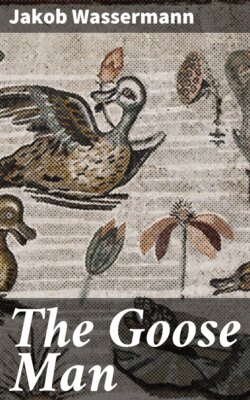Читать книгу The Goose Man - Jakob Wassermann - Страница 20
На сайте Литреса книга снята с продажи.
IV
ОглавлениеTable of Contents
Not far from Hadebusch’s was a little café known as The Paradise. Everything in it was diminutive, the proprietor, the waitress, the tables, the chairs and the portions. There the brethren from the Vale of Tears assembled to drag the gods down into the dust and destroy the universe in general.
Daniel wended his way thither. He knew the liliputian room and the starved faces. He was personally acquainted with the painter who never painted, the writer who never wrote, the student who never studied, and the inventor who never invented anything. He knew all about the sculptor who squandered such talents as he may have had in tinkering with plaster casts, the actor who had been on a leave of absence for years, and the half dozen mendicant Philistines who came here day after day to have a good time in their own repelling fashion. He knew the young Baron von Auffenberg who had broken with his family for reasons that were clear to no one but himself. He knew Herr Carovius, who invariably played the rôle of the observer, and who sat there in a sort of mysterious fashion, smiling to himself a smile of languishing irony, and stroking his hand over his long hair, which was cut straight across at the back of his neck.
He knew, ah, he knew by heart, the grease spots on the walls that had been rubbed in by the heads of the habitués, the indelible splotches on the tables, the hartshorn buttons on the proprietor’s vest, and the smoke-coloured curtains draped about the tiny windows. The loud, boisterous talking, the daily repetition of the same hackneyed remarks, the anarchistic swashbuckling of the painter whom his comrades had dubbed Kropotkin—all of these were familiar stories to him. He knew the philosophic cynicism of the student who felt that he was the Socrates of the nineteenth century, and who looked back on twenty-five wasted semesters as on so many battles fought and won.
The most interesting personage was Herr Carovius. He was a well-read man. That he knew a great deal about music was plain from many of his chance remarks. He was a brother-in-law of Andreas Döderlein, though he seemed to take anything but pride in the relationship. If any one mentioned Döderlein’s name in his presence, he screwed up his face, and began to shuffle about uneasily on his chair. He was an unfathomable, impenetrable personality. Even if his years—he was forty-five—had not won for him a measure of esteem, the malicious and mordant scorn he heaped on his fellow-men would have done so. People said he had a good deal of money. If this was brought to his attention, he employed the most ghastly oaths in asserting his poverty. But since he had neither calling nor profession and spent his days in unqualified idleness, it was apparent that his assertions on this point were wholly unfounded, and this despite the virility of his unconventional language.
“Say, tell me, who is that lanky quack there?” asked Herr Carovius, pointing to Daniel and looking at Schwalbe the sculptor. He had known Daniel for a long while, but every now and then it gave him a peculiar kind of pleasure to play the rôle of the newcomer.
The sculptor looked at him indignantly.
“That is a man who still has faith in himself,” he remarked rather morosely. “He is a man who has bathed in the dragon blood of illusions, and has become as invulnerable as Young Siegfried. He is convinced that the people who sleep in the houses around this part of town dream of his future greatness, and have already placed an order with the green-grocer for his laurel wreath. He has not the faintest idea that the only thing that is sacred to them is their midday meal, that they are ready to drink their beer at the first stroke of the gong, and to yawn when the light appears on Mount Sinai. He is completely taken up with himself; he is sufficient unto himself; and he gathers honey. The bee will have its honey, and if it is unable to get it from the flowers, it buzzes about the dung heap. As is evidently the case here. Prosit Nothafft,” he said in conclusion, and lifted his glass to Daniel.
Herr Carovius smiled in his usual languishing fashion. “Nothafft,” he bleated, “Nothafft, Nothafft, that is a fine name, but not exactly one that is predestined to a niche in Walhalla. It strikes me as being rather more appropriate for the sign of a tailor. Good Lord! The bones the young people gnaw at to-day were covered with meat in my time.”
And then, clasping his glasses a bit firmer onto his nose, he riveted his blinking, squinting eyes on the door. Eberhard von Auffenberg, elegant, slender, and disgruntled, entered to find life where others were throwing it away.
It was far into the night when the brethren went home. As they passed along through the streets they bellowed their nocturnal serenades at the windows of the otherwise peaceful houses.
As the hilarious laughter and vocal rowdyism reached Daniel’s ear, he detected from out of the hubbub a gentle voice in E-flat minor, accompanied by the inexorable eighth-notes sung with impressive vigour. Then the voice died away in a solemn E-flat major chord, and everything was as if sunk in the bottom of the sea.
